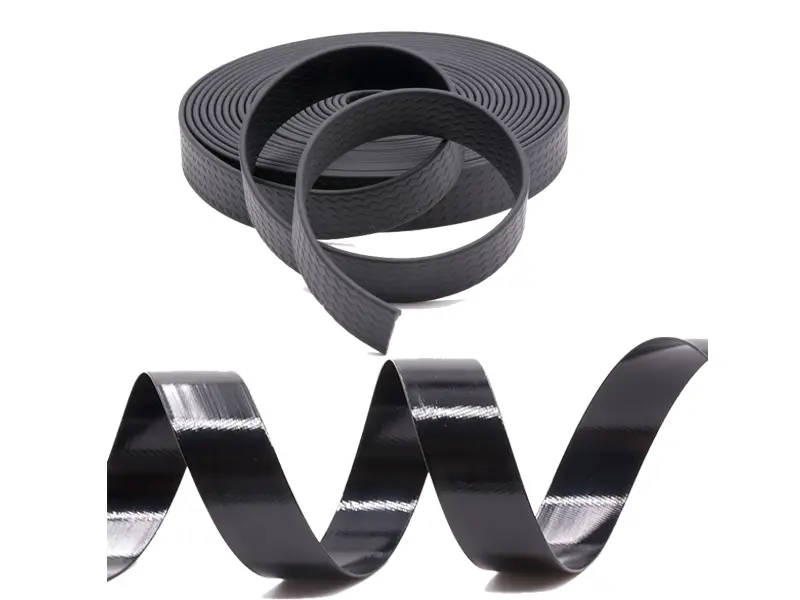For products that demand absolute resistance to water, dirt, and abrasion, coated webbing is the undisputed champion. This innovative material, often seen as a modern alternative to leather, encapsulates a strong core (typically polyester webbing) within a protective plastic sheath. The result is a strap that is incredibly durable, waterproof, and easy to clean.
But a critical choice awaits every product designer and B2B buyer: which coating material is right for your application? The two dominant options are Polyvinyl Chloride (PVC) and Thermoplastic Polyurethane (TPU). While they may look similar at first glance, their underlying chemistry creates significant differences in performance, safety, and cost.
What is PVC Coated Webbing?
PVC is a widely used, cost-effective plastic. To make it flexible enough for a coating, plasticizers are added. PVC coated webbing is known for its high gloss finish, excellent water resistance, and affordability. It is a workhorse material used in countless everyday products.
What is TPU Coated Webbing?
TPU is a more advanced polymer, a class of plastic known as a thermoplastic elastomer. It possesses a unique combination of properties: the strength of rigid plastic and the flexibility of rubber. It achieves this flexibility without the need for plasticizers, which has important implications for environmental and skin-contact safety.
The Head-to-Head Comparison: PVC vs. TPU
Let's break down the five key areas where these materials differ, helping you align the right material with your product's needs.
| Feature | TPU Coated Webbing | PVC Coated Webbing |
|---|---|---|
| Flexibility (especially in cold) | Excellent; remains flexible in extreme cold | Good; can become stiff and crack in freezing temperatures |
| Abrasion & Scratch Resistance | Exceptional; highly resistant to scratches and tearing | Good; but more prone to surface scratching and scuffing |
| Environmental & Skin Contact Safety | Excellent; plasticizer-free, often recyclable, skin-safe | Moderate; contains plasticizers, less eco-friendly |
| Cost | Higher | Lower, more economical |
| Feel & Aesthetics | Soft, matte, rubber-like feel | Can feel more "plasticky," often has a glossy finish |
1. Flexibility in Extreme Conditions (Winner: TPU)
This is a critical performance differentiator. TPU webbing remains remarkably flexible even in deep-freeze conditions (-40°C/-40°F). PVC, due to its plasticizers, can become stiff, brittle, and may crack under stress in the cold. For all-weather outdoor gear or products sold in cold climates, TPU is the far superior choice.
2. Durability and Abrasion Resistance (Winner: TPU)
While both are durable, TPU has inherently higher resistance to abrasion, scratches, and tearing. Its elastomeric nature allows it to absorb impacts and resist scuffs better than the more rigid surface of PVC. This is vital for high-wear applications like dog collars and leashes or industrial tool belts.
3. Environmental Impact and Safety (Winner: TPU)
TPU is a more environmentally friendly material. It does not contain phthalate plasticizers, which have raised health concerns in some regions. This makes TPU the mandatory choice for products with prolonged skin contact, especially in the medical and baby product industries. Many TPU grades are also recyclable.
4. Cost (Winner: PVC)
There is no contest here. PVC is significantly more affordable to produce than TPU. For applications where cost is the primary driver and extreme performance is not required, PVC remains a viable and popular option.
Application-Based Recommendations: Which Should You Choose?
Choose TPU Coated Webbing for:
- High-End Pet Products: For premium dog collars, leashes, and horse tack where durability, cold-weather performance, and a quality feel are brand differentiators.
- Medical and Safety Equipment: For patient straps, gait belts, and safety harnesses where skin-contact safety and cleanability are non-negotiable.
- All-Weather Outdoor & Military Gear: For backpack straps, tool belts, and equipment tie-downs that must perform flawlessly in ice, snow, and rough conditions.
Choose PVC Coated Webbing for:
- Cost-Sensitive Consumer Goods: For utility straps, luggage handles, and other applications where affordability is key.
- Waterproof Bags & Tarpaulins: Where its excellent water resistance is needed but high abrasion or extreme cold are not major concerns.
- General Purpose Tie-Downs: For light-duty straps used in moderate climates.
Choosing between PVC and TPU is about aligning material science with your brand promise. One delivers unbeatable value; the other delivers uncompromising performance. We manufacture both and can guide you to the perfect material for your product's specific demands. Contact our experts today for a free consultation and samples.

